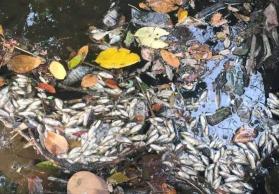Equipo Maiz Highlights Poor Economic Performance Under Bukele
With elections taking place in El Salvador in February and March, the Bukele regime’s media campaign is in full swing. His government, in between knocking down monuments celebrating the country’s Peace Accords and hosting international spectacles, has focused on positioning itself as the only possible guardian of security in the country. However, with recent polls showing that 85% of Salvadorans have noticed an increase in food prices in the last three months and 70% of respondents saying that economic issues are the biggest challenge that the country currently faces, these concerns deserve a closer look.
Equipo Maíz has been creating accessible educational tools to understand El Salvador’s political, social, and economic landscape since the 1980s. Below, we offer several translations of their recent weekly newsletters, which offer a counterweight to the Bukele government’s narrative of prosperity and “inverse migration.”
A One-Way Trip
9/29/23- Every day, hundreds of Salvadorans leave the country because they cannot find work or their income is not enough to live on. However, according to the president, in the near future, people will no longer leave, and those who have migrated will return.
What Bukele Said
On Independence Day, September 15, the president said three things about migration:
“We have reduced irregular migration of Salvadorans leaving the country.”
“We are on our way, slowly but surely, towards having inverse migration-- more people will be coming back than will be leaving.”
60.2% of Salvadorans that live in the United States plan to return to El Salvador in the future.”
The Data: Those Who Go to the U.S. WITH a Visa
There is a type of immigration of people who go with a visa. Some of those people come back to the country, but some of them stay in the U.S. and don’t come back.
In 2022, according to the National Migration and Immigration Directorate, the difference between the number of people who returned and the number of people who stayed in the U.S. was 73,000. In 2023, that number is already 69,000. These numbers are an initial indicator that there are more people leaving the country than returning.
The Data: Those Who Go to the U.S. WITHOUT a Visa
Between 2019 and September 2023, 360,000 Salvadorans were detained at the U.S. border trying to enter the country irregularly, without a legal permit.
According to immigration experts, for every person that is unable to enter the U.S. without documents, there is another who is successful. Therefore, in the 4 year and 9 month period, approximately 360,000 people left the country-- 360,000 that successfully entered the U.S. and 360,000 more that were detained at the border. From this group, some stay in Mexico or Guatemala and others return to the country. The vast majority try to leave again, which is another indication that refutes the president’s claims.
In the 10 years of FMLN governments, 71,000 people left the country per year. Under Bukele’s government, 151,000 have left every 12 months, which is more than double.
In conclusion, the migratory reality is contrary to what the president says: the number of (mostly young) people planning to leave and remain out of the country is what is actually increasing. The government is burning the main The government is burning the country's main asset, its people.
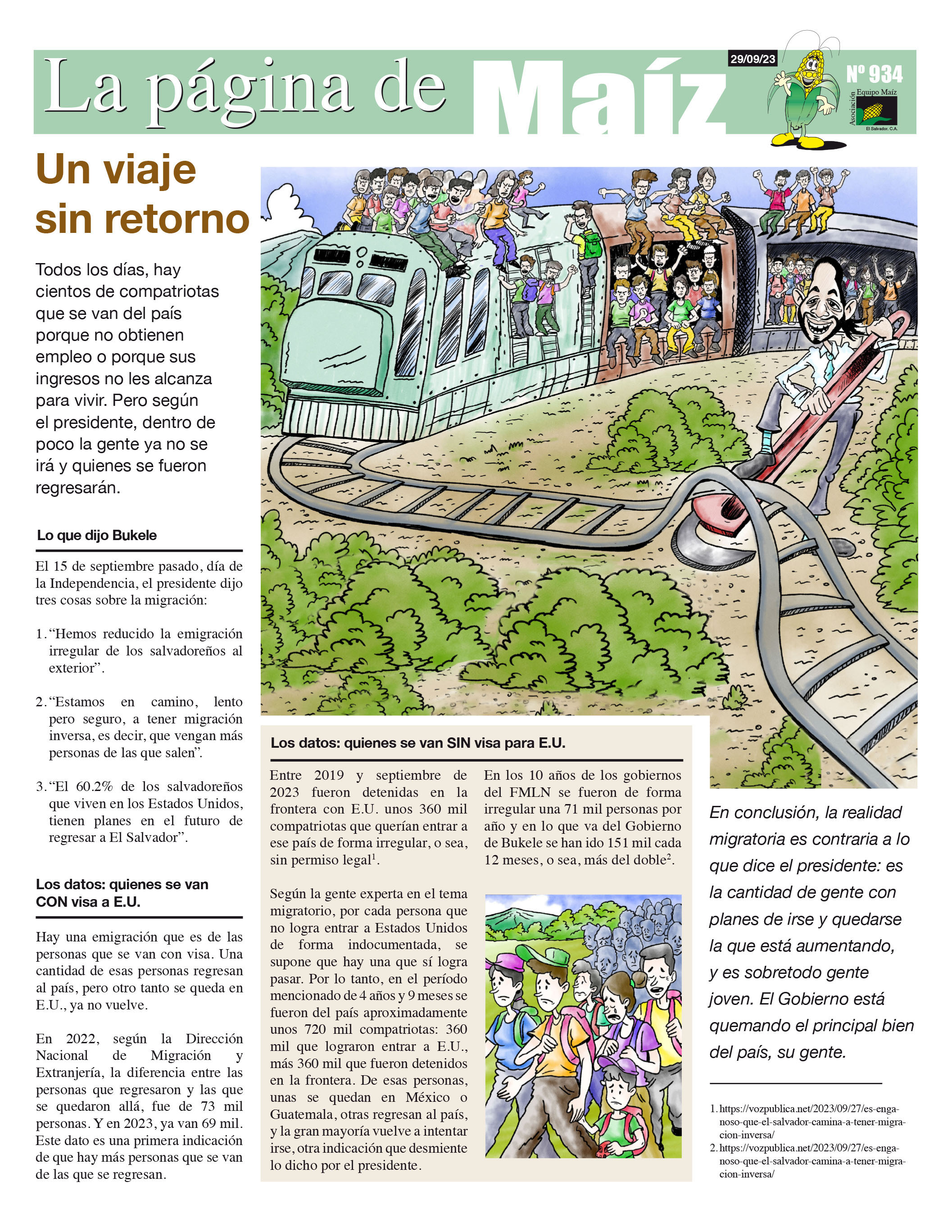
Alarming Rise in Prices with no Measures to Protect the Population
10/13/23- Food prices have skyrocketed and people are complaining that their wages aren’t even enough to cover basic goods.
Everything is Expensive
Between August 2021 and August 2023, basic food staples have gone up 30% in rural areas and 26% in urban areas. These staples are the foods that are most consumed in the country: tortillas, beans, rice, milk, eggs, oil, margarine, sugar, certain meats, fruit, and vegetables. Some prices have gone up more than others.
El Salvador: Changes in Some Basic Food Costs
| Product | Measurement | Sept 2021 Price | Sept 2023 Price | Increase |
|---|---|---|---|---|
| Medium Eggs | Carton (30 eggs) | $2.33 | $4.52 | 94% |
| White Onion | Unit | $0.19 | $0.34 | 79% |
| Guiscil Squash | Unit | $0.26 | $0.46 | 77% |
| Plum Tomatoes | Unit | $0.08 | $0.14 | 75% |
| Margarine | 50 lb box | $26.00 | $45.00 | 73% |
| Flour | 50 lb bag | $15.50 | $25.00 | 61% |
| Sunflower Oil | 750 ml bottle | $1.25 | $1.96 | 57% |
Source: Consumer Defense Center
Prices will continue to rise because many of these products are brought from outside of the country by import companies which will continue to sell them at high prices in Salvadoran markets, absent any government measures to prevent it or to support rural families in producing more and at a lower cost.
Where did the loan money go?
In four years and two months (June 2019- August 2023), the Salvadoran government received $8.64 billion in debt. What has happened to that money? There are no jobs, everything has gotten more expensive, wages are frozen, poverty has gone up, and more people are leaving the country.
The government is more interested in benefiting the importers tied to the ruling family, spending money on beauty pageants and propaganda, defaming the opposition, and putting people, many of them innocent, in jail.
El Salvador is on the edge of a basic food shortage crisis and faces further increases in basic food prices due to the fact that the Bukele regime has abandoned the rural populace and has turned the country into one that imports food.
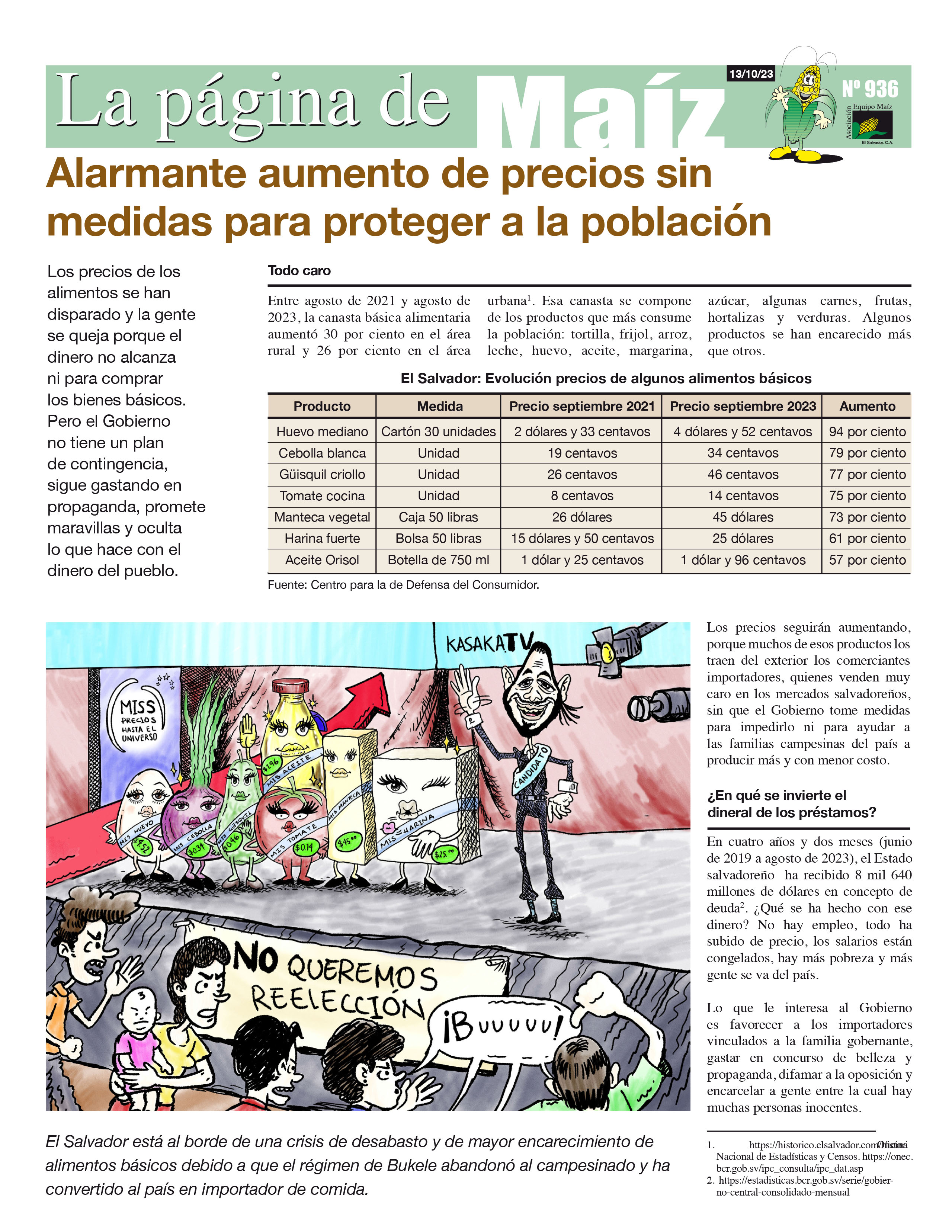
2024 Budget: Less for Public Services and More Propaganda and Militarization
10/20/23- The government presented its 2024 budget bill to the Legislative Assembly, totaling $9.07 billion in spending.
An Underfunded Budget
The government will not raise as much money in taxes as it intends to spend. There will be a deficit of $1.488 billion, 16% of the budget, that will have to be paid by acquiring debt. This would be like a family wanting to spend $6,000 in a year when their income is only $5,000. That family would have to go into debt by $1,000. That is what the Salvadoran government is doing.
Cuts in Social Spending for 2024
The 2024 budget will see significant reductions in social spending. This shows that the government is unconcerned about the deterioration of the agriculture sector, living conditions in small communities, or the lack of housing.
| Sector | 2023 Budget, Millions ($) | 2024 Budget, Millions ($) | Reduction, Millions ($) |
|---|---|---|---|
| Agriculture | 136.5 | 90.9 | 45.6 |
| Local Development | 52.6 | 40.0 | 12.6 |
| Housing | 22.4 | 10.3 | 12.1 |
| Tourism | 54.8 | 43.9 | 10.9 |
The budget also reduces public works, construction, and government worker training by $35 million.
Health Sector Cuts
- $2 million reduction for salaries.
- $4 million cut for “Early Childhood, Youth, and Adolescent Primary Care.”
Education Sector Cuts
- $7 million reduction for salaries.
- $125 million reduction for teacher training, innovation, and school repairs.
- $4 million reduction in early childhood education (Nacer, Crecer y Aprender).
- $295,000 reduction in scholarships for families of the El Mozote Massacre victims.
- $5 million less for school equipment and infrastructure.
- The elimination of an early childhood program.
- The budget does not include $40 that the government owes the University of El Salvador from the 2022 and 2023 budgets and they will not build the 4 new campuses they promised 3 years ago.
While the government is cutting the budget for these important social programs, they are increasing the Armed Forces budget by $7 million and it is not reducing the publicity budget. So there will be more money for propaganda and to continue militarizing the country.
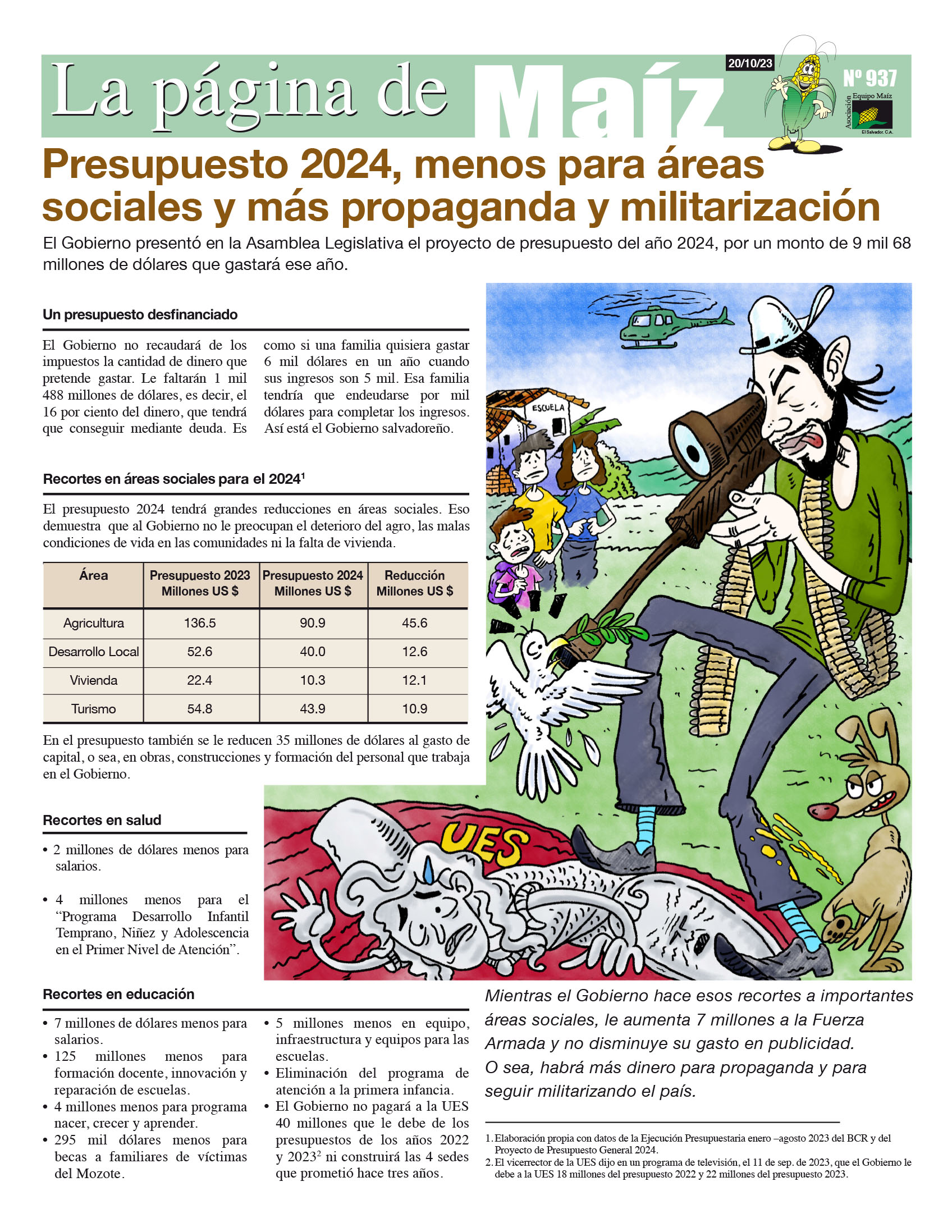
El Salvador has the Worst Economic Performance in Central America
11/17/23- This year, El Salvador finds itself in last place in Central America in some of the main economic indicators, according to a study by the United Nations’ Latin America and Caribbean Economic Commission (CEPAL).
What does the report say?
This year, El Salvador showed the least growth in goods and services, both in the public and private sectors. This means that Salvadoran businesses invested less money and created fewer jobs than the rest of the countries in the region.
Costa Rica was first in production, with an increase of 3.8%. They were followed by Guatemala and Honduras, with 3.4% growth each and Nicaragua, with 2.4%. El Salvador was last, with 2.1%. Last year’s results were the same, with El Salvador in last place.
El Salvador also had the least growth in terms of businesses that sell their products internationally (exports). In Costa Rica and Nicaragua, exports grew by 13% and 10%, respectively. In Guatemala and Honduras, exports fell by 2.7% and in El Salvador, they dropped by 3.2%. Many of those companies, like garment factories, laid off employees.
The purchase of international goods (imports) also dropped the most in El Salvador, with a decrease of 4%. This decrease in purchases can be explained by companies investing less in purchasing raw materials, the majority of which are produced outside of the country.
The study also showed that the effective minimum wage (that is, income purchasing power) decreased the most in El Salvador, due to how low they are and that food and services have gotten much more expensive. Effective wages grew in Nicaragua but fell in all other countries. El Salvador’s decrease was greatest.
Economic Indicators of Central America (2023)
| Indicator | Costa Rica | Guatemala | Honduras | Nicaragua | El Salvador |
|---|---|---|---|---|---|
| Domestic Production Growth | 3.8% | 3.4% | 3.4% | 2.4% | 2.1% |
| Exports | +13% | -2.7% | 2.7% | +10% | -3.2% |
| Imports | +6.8% | -1% | -1% | -2% | -4.0% |
| Effective minimum wage (since 2021) | -1.3% | -2.8% | -2.8% | +2% | -9.25% |
Source: CEPAL. “2023 Economic Study of Central America and the Dominican Republic and Outlook for 2024.” November 2023.
As Nayib Bukele’s government continues to create distractions and says that the country is an example for the rest of the world and the best in Latin America, this (and other) data debunk those claims.
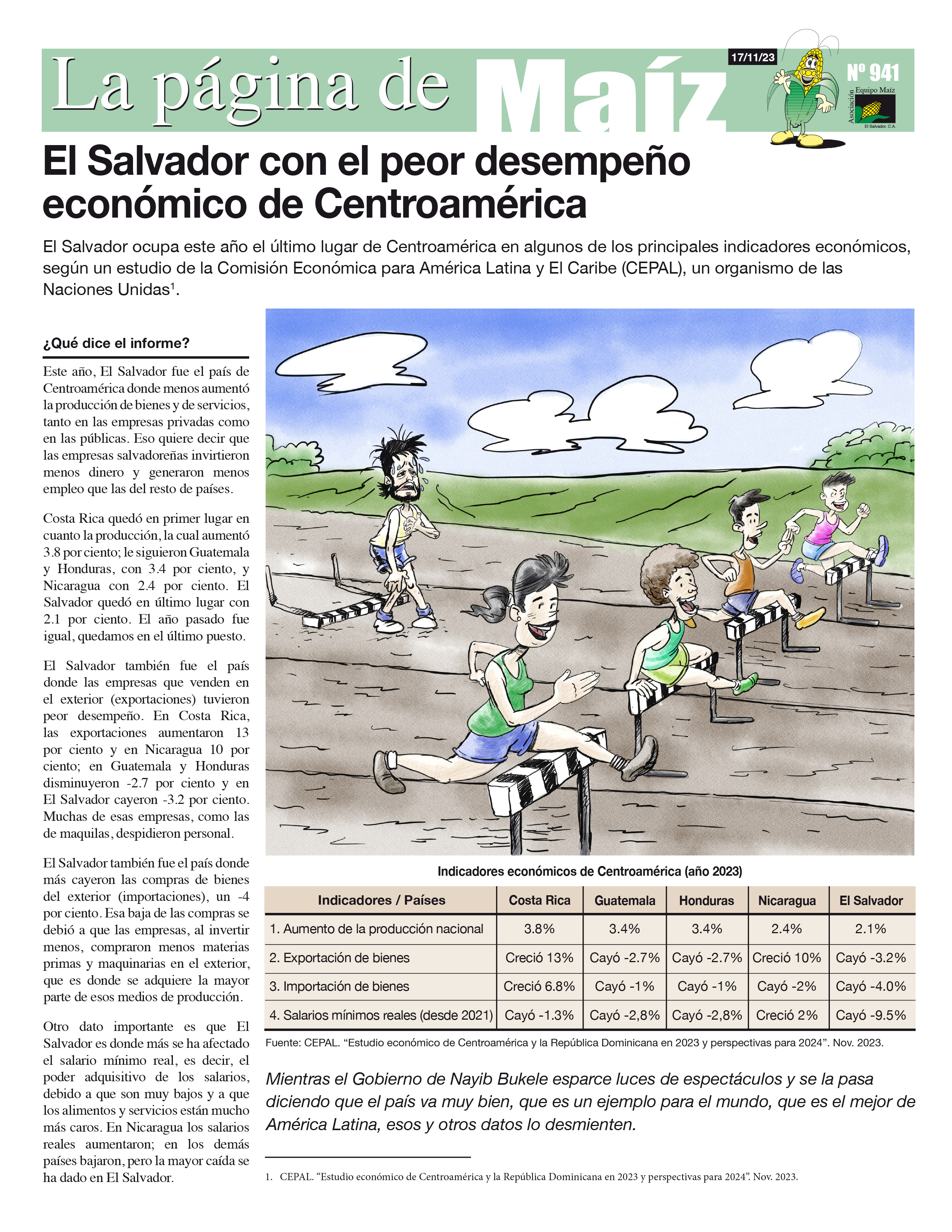

 "I am a CISPES supporter because continuing to fight for social justice and a more people-centered country means continuing the dream and sacrifice of thousands of my fellow Salvadorans who died for that vision.” - Padre Carlos, New York City
"I am a CISPES supporter because continuing to fight for social justice and a more people-centered country means continuing the dream and sacrifice of thousands of my fellow Salvadorans who died for that vision.” - Padre Carlos, New York City